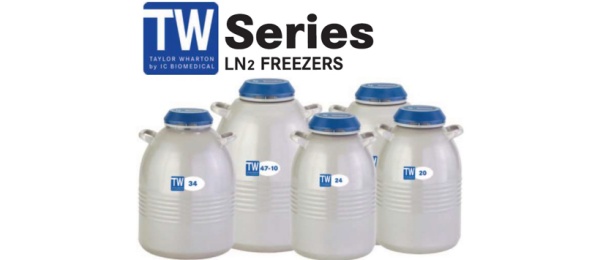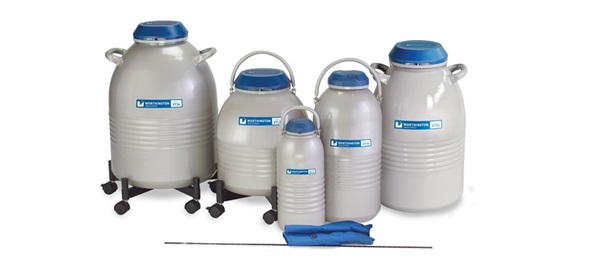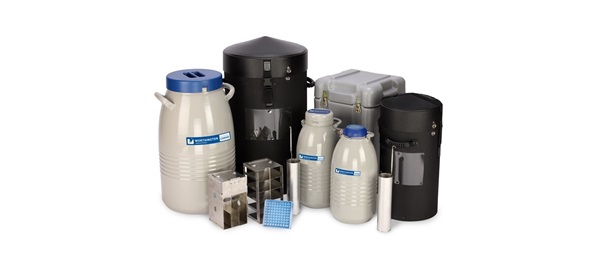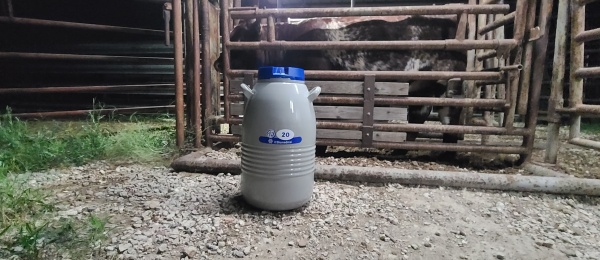
Used Semen Tank Buyer's Guide
by Randy Goode
Any time a person decides to buy something the first
inclination is to ask the question, “Can I buy a used one
cheaper?” It happens with cars all the time and with all the
uncertainty and stress that comes with that decision.
Buying a used semen tank is much the
same as buying a used car. If you know what to look for, and
what to avoid, you can luck into a great deal. On the other
hand, the whole experience could turn into a nightmare
scenario.
I’ve been buying and selling new and
used semen tanks for over 30 years. I’ve found great deals,
as well as wasted money on semen tanks that should have been
scrapped years before. Here’s my personal guide to buying a
used semen tank.
What is the price?
Saving money
is the main reason for purchasing used over new so there is
no point in buying a used semen tank if you can get a new
one for the same price or less. There are a few exceptions
to the rule but if a used
brand name
semen tank is the same price as a new one of the same model,
why would you even consider it.
I typically cut off consideration of
buying a used tank at 60% of current new value. Anything
above this amount makes no sense as the risk far outweighs
the benefits of the small savings. Under 40% of current new
price is considered a bargain and worth checking out but,
beware of off brand units that typically have issue within
just a few years.
Also, think
about what you are going to store in the tank. If you are
buying semen at $5 per straw that is easily replaced, a used
semen tank will probably be fine. If you are storing embryos
worth $1500 each from a deceased donor, you might want to
think twice about the risk you are taking in buying a used
tank.
Does the tank fit your needs?
A great deal
on a tank doesn’t always mean a great deal for
you
if the application is not a fit for what you need. If you
intend to move the tank to and from the barn where you AI,
or take it to pick up purchased semen, a large tank may be
more expensive than you think.
Typically, large tanks are found at
great deals because they are harder to carry due to bulk and
weight. Obviously a 47-liter tank is much heavier than a
20-liter semen tank, so it might take 2 people to move it
safely.
On the other side of the coin, a
10-liter tank might seem like a perfect size for moving
around but it’s hold time may be well short of what you need
to store semen long term. There are few things less
irritating that a storage tank that must be filled every
month. On the other hand, a small tank may be perfect if you
have a large tank for storage and a small one to get the
semen to your breeding area.
Finding a
used semen tank that fits perfectly would be great but is
not always possible. I rarely buy anything that doesn’t fit
at least 75% of my criteria for use. For example, I need to
move semen from my main 38-liter tank and a 10 liter would
be perfect for this. I find a 20-liter tank for 25% of the
cost of a new one. The 20-liter is much smaller than the
main tank and easier to move around but obviously it is
bigger than a 10-liter. The price is right though, and the
tank will work, although not as well as a 10-liter. I would
consider this around a 75% fit and a good trade off.
Large or small, make sure the tank
fits as closely as possible and avoid buying something that
doesn’t work for your application.
Who is selling it?
If you are searching classified ads
on the web, the chances of getting a good deal drop
dramatically. There are more than a few people that are
willing to deceive you for a few dollars and finding a
legitimate seller is key to getting a good deal.
The reason I mention this is because
there are auctions that sell semen tanks across the country.
They are usually mixed in with lots of other items, and the
buyer takes everything as a package deal at what he feels is
a reasonable price. The problem is, he may not have a clue
what the tank is, and therefore has no history on it at all.
There are many times I have
purchased used tanks from sellers that not only did not know
the value of the tank, even worse, they didn’t even know
that it was designed to hold liquid nitrogen. These tanks
are obviously not tested in any way and the sales are final.
On the other hand, if your long-time
neighbor is retiring and has a tank that is full of semen,
you would be less hesitant to trust that the tank is in good
working order.
What is the physical condition of
the tank?
When I go to check out a semen tank,
the first thing I do is check the exterior. If I see a lot
of sharp dings or missing paint, I immediately consider this
a red flag. Exterior dings could mean it sat in a place that
allowed it to have random stuff banged into it. Not a good
thing.
Next, I check to make sure all the
canisters are there and if there is anything inside them. If
there are old canes and straws in a dry tank, it’s
definitely a concern.
If the vacuum port cover is missing
from the tank it may be an issue. Semen tanks sit around
unmonitored for long periods of time and a curious child
might unknowingly release the vacuum from the tank.
Conversely, these covers fall off quite easily and there may
be no issue at all.
If the tank is empty, check the
bottom. If it’s scarred up from being dragged across a
concrete floor it might give you a good idea of how the tank
was treated.
How old is the tank?
The older a semen tank, the more
likely it is to have issues. Currently, the consensus is 10
years as a point to consider replacement. I tend to agree
with this even though I have tanks that are closer to 30
years old in my inventory.
Older tanks can be used if you know
how to handle, or not handle, them. Tanks that are
stationary, this includes filling with nitrogen, are more
likely to last longer.
Is it a brand name tank?
There are quite a few semen tank
manufacturers, but the 2 leading ones are MVE and
Worthington (Taylor Wharton). Both manufacturers have been
around for a long time and are well known for their quality
and reputation. Any tank produced by these companies I would
consider above others in the industry.
In my experience. most of the off
brands have multiple issues. Tanks from other countries have
a reputation for poor workmanship and high failure rates. I
do know several people that have used off brand tanks for
years with no problem, but I don’t consider it worth the
risk with my inventory to use these tanks.
Where is the tank located?
One of the most challenging issues
is getting a good deal on a semen tank locally. With
internet access it is easy to go online and search the world
but that might create problems of its own.
A used tank in perfect condition
that must be shipped might get banged around so much that it
arrives in a very different state. If the box is turned
upside down and bounced around in the back of a delivery
truck, the chances are good that it will arrive with a
broken neck tube. Even new semen tanks are not always able
to withstand the total disregard for how they are handled on
the way to their destination.
Used tanks are much more susceptible
to damage because as they age, the fiberglass neck tube
weakens. Add a weakened neck to an uncaring shipping agent
and you’ve lost your tank with nothing but an insurance
claim or scrap aluminum to show for it.
Is the tank currently in use?
Tanks that are in use are always
much more desirable. An empty tank that has been sitting
around and is untested is a huge gamble.
Tanks with nitrogen and semen in
them give a level of assurance that the tank is in good
condition. These tanks are usually purchased at a premium
and I have run across a few that were priced higher than a
new tank.
One issue with getting a good
working tank is the owner wants to sell the tank with the
semen inventory in it. Unless you have the same breed, and
taste of the current tank owner, the price is probably going
to be more than most people are willing to pay.
One mistake I see when buying a tank
with inventory is the assumption that they can sell the
semen and make a profit. Unless you already have a buyer for
the semen, my suggestion is not to make this miscalculation.
I speak from experience. More than one experience.
Used Tank Buyer's Guide Table
Below is a table to help decide if a
used tank is a good buy or should be avoided.
|
Price |
Less than 40% of new price |
+2 |
|
|
40% -50% of new price |
+1 |
|
|
50% -60% of new price |
-1 |
|
|
More than 60% of new price |
-2 |
|
|
|
|
|
Application Fit |
Perfect fit |
+1 |
|
|
75% fit |
0 |
|
|
50% or less fit |
-2 |
|
|
|
|
|
Age |
Less than 3 years old |
+2 |
|
|
3 to 6 years old |
+1 |
|
|
6 to 10 years old |
0 |
|
|
10+ years old |
-1 |
|
|
|
|
|
Brand Name |
MVE, Worthington/Taylor
Wharton |
+1 |
|
|
Non-Brand Name |
0 |
|
|
|
|
|
Location |
Local |
+2 |
|
|
To be shipped |
-1 |
|
|
|
|
|
Condition |
Excellent, no dents |
+1 |
|
|
Average |
0 |
|
|
Dent or paint
missing/pealing |
-1 |
|
|
|
|
|
Owner |
Known, Reputable |
+2 |
|
|
Unknown |
0 |
|
|
|
|
|
Current Service |
Full, working |
+3 |
|
|
Empty, known history |
+1 |
|
|
Empty, unknown history |
-1 |
|
|
|
|
Using the table will give a
reasonable starting point to help determine if a tank is
worth the risk. Add the score for each category and total
them. A total score of 5 or more would prompt me to consider
purchasing a tank. The higher above 5 the score, the less
the risk and the better the deal.
As an example, I recently purchased
a 20-liter brand name semen tank for about 50% of what a new
one would cost. It was located only 30 miles away and I knew
the owner and had filled the tank for years with no issue.
The exterior was excellent for a 11-year-old tank and he had
just sold his entire semen inventory , leaving the nitrogen
in it.
The customer I was purchasing the
tank for was getting into breeding cattle and needed a tank
to store semen and work from. It was the perfect size and
fit exactly for his application. Based on the table above I
scored the tank like this…
Price +1
Application fit +1
Age -1
Brand Name +1
Location +2
Condition +1
Owner +2
Current Service +3
Total: 10
With a total
score of 10, I considered this a great deal and purchased it
for my customer who is very happy with the outcome. How
often does this type of deal materialize? In my local area I
see a tank for sale with a score this good about twice per
year.
Final Thoughts
Before you purchase a used tank be
sure to consider the semen that will be stored in it. Just a
few straws at $20 each will add up over a few years and soon
you will have a total investment of thousands of dollars in
inventory.
If you have the time to look, and
the patience to wait for a tank that fits your needs, there
are some great used semen tank deals out there.















